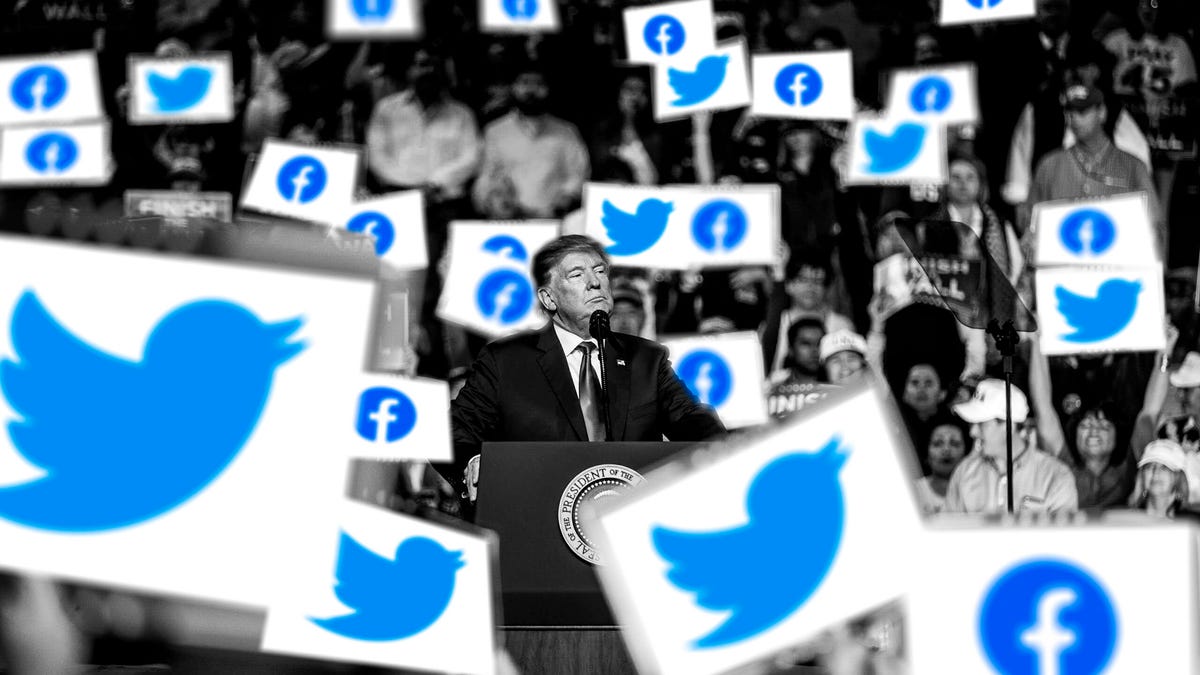Facebook, Twitter tested by Trump's false victory claims
The actions by the social networks demonstrate similarities and differences in their approaches.

President Donald Trump has more than 87 million followers on Twitter and 33 million followers on Facebook.
Facebook and Twitter took action on misleading posts by President Donald Trump about election results, highlighting both similarities and differences in their treatment of political messages. Major news organizations called the election for Democrat Joe Biden on Saturday morning, even as the president continued tweeting grievances.
After polls closed on Tuesday, both companies labeled a post in which the president alleged without evidence that his political opponents were "trying to steal the election" and that he was "up BIG" in the vote count. Twitter labeled the tweet as potentially misleading and obscured it from immediate view, among other measures. Facebook labeled an identical post with information that the vote count was ongoing. On Saturday, the president used social media to again baselessly claim the election was being stolen from him.
Social media companies have ramped up their fight against misinformation, including posts from high-profile politicians, amid scrutiny from civil rights groups, politicians and celebrities. The actions against the Trump posts reflect heightened vigilance against posts that include premature election results or misleading information.
The social networks' approaches also shine a light on differences in the way Facebook and Twitter moderate content from politicians. The 2020 US election has been a major test, and researchers are still assessing the effectiveness of the companies' efforts.
Facebook typically has a mostly hands-off approach to posts from politicians, exempting them from third-party fact-checking. Facebook CEO Mark Zuckerberg has repeatedly defended the policy, saying he believes the public should be able to see what politicians say. However, the company has recently started labeling posts from politicians and directing users to its voting information center. It also began adding information about the projected winner of the race to questionable posts, a move endorsed by Alex Stamos, the social network's former chief security office, who is now at the Stanford Internet Observatory.
New labels from FB and YouTube, Twitter's still stuck in time. pic.twitter.com/mCeefo0FzI
— Alex Stamos (@alexstamos) November 7, 2020
Still, Twitter has taken a tougher stance than Facebook against misinformation posted by politicians. In addition to obscuring tweets behind warning notices (users must click through to read the tweets), the short-message service also takes steps to limit the spread of those tweets on its service by curtailing the ability of users to engage with them. Twitter appended cautionary notes to five of seven Trump tweets on Saturday morning, including one in which he wrongly claimed he had won.
Those different approaches were on full display as votes were counted on election night. In addition to obscuring Trump's tweet that baselessly claimed the election was being stolen, Twitter prevented users from taking advantage of two features, liking and retweeting, that can contribute to the spread of a tweet on the service.
Read more: No election winner yet: How to spot misinformation while you wait for results
Twitter's label Trump's initial tweet said its contents was "disputed and might be misleading." It also added an obstacle for users who wanted to read it, requiring users need to click a View button, which will also provides a link to a page with context from various news outlets. Users can still share the tweet if they weigh in with their own comment.
Facebook labeled an identical post shared on Trump's page but took more time to apply its notice. Unlike Twitter, Facebook didn't limit the reach of the post or hide it behind a notice. The Facebook label under Trump's post says, "Final results may be different from initial vote counts, as ballot counting will continue for days or weeks." The notice includes a link to Facebook's voting information center.
Jury still out on labeling
Claire Wardle, US director of First Draft News, a nonprofit focused on tackling misinformation, said it's unclear how well labels work but that there should be more consistency among the social media sites.
"I'm slightly frustrated that they all have different labeling designs, because I think it's confusing for the audience," Wardle said.
Platforms also need to be more transparent about how they make their content-moderation decisions. Researchers still need to examine how well labels work, including if content is being amplified outside of major social networks, she added.
"We have to be careful that we don't just assume that any type of label or any type of intervention is a net gain," Wardle said.
Conservatives have pushed back against labeling, accusing social networks of intentionally suppressing their speech. Facebook and Twitter have denied these allegations, adding that labels provide users more context.
The Trump campaign didn't responded to a request for comment.
In some cases, Twitter didn't add a label to tweets that other platforms flagged.
For example, Facebook and Google-owned YouTube added labels under a video that showed Trump falsely claiming, "Frankly, we did win this election." The video shared on Trump's Facebook page has 10 million views. The video has 248,500 views on Trump's YouTube channel.
The same video, which was shared by the Trump campaign on Twitter, has more than 16 million views on the social media site. Twitter didn't apply a label to it.
A Twitter spokesman noted that the video was shared by media outlets. "Recordings or clips of the press conference on their own are not a violation of our policies," he said in an email.



